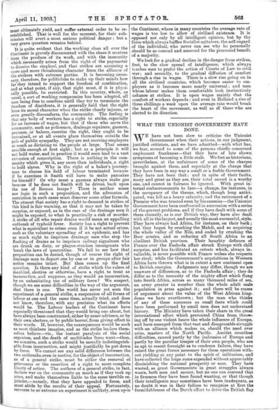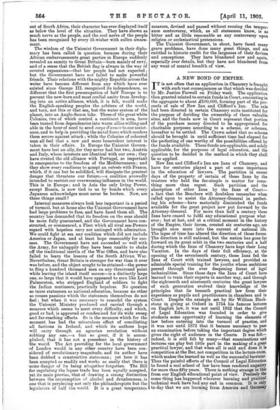WHAT THE UNIONIST GOVERNMENT HAVE DONE.
WE have not been slow to criticise the Unionist Government when their actions, in our judgment, justified criticism, and we have admitted—with what has, we fear, seemed. to some of the persons chiefly concerned unpleasant frankness—that they have of late shown symptoms of becoming a little stale. We fret as historians, nevertheless, at the unfairness of some of the charges brought against them, and especially at the charge that they have been in any way a small or a feeble Government. They have not been that ; and in spite of their faults, many and great as they are, their total record is a worthy one, and cannot in fairness be ignored. With great ternal embarrassments to face—a change, for instance, in the occupancy of the throne, which, though long antici- pated, was felt as a heavy calamity, and the retirement of a Premier who was trusted even by his enemies—the Unionist Government have been confronted in succession with a series of the gravest problems, and if they have dealt with some of them clumsily, as is our British way, they have also dealt with all in the largest, and usually the most successful, style. They have always had Africa, for instance, on their back ; but they began by crushing the Mahdi, and so acquiring the whole valley of the Nile, and ended by crushing the Boer armies, and so reducing all South Africa to an obedient British province. Their haughty defiance of France over the Fashoda affair struck Europe with chill surprise, and has facilitated an entente which, always in- valuable, is never possible with France unless she respects her rival; while the Government's acquisitions in Western Africa have thrown what is in extent a new continent open to British energies. Judgments may differ, though we are unaware of differences, as to the Fashoda affair ; they do differ as to the necessity of the mighty effort which flung into South Africa, across so many thousand miles of sea, an army greater in number than the whole adult male population in arms against it; and there will be reams of argument about the value of the West African king- doms we have overthrown ; but the man who thinks of any of these successes as small feats which could have been performed by small men does not understand history. The Ministry have taken their share in the great international effort which prevented China from throw- ing off by one violent heave the whole influence of Europe, and have emerged from that vast and disagreeable struggle with an alliance which makes us, should the need ever arise, masters of the North Pacific. Amidst countless difficulties, caused. partly by the jealousies of Europe and partly by the peculiar temper of their own people, who are as apt to resent foresight as to condemn failure, they have raised the great forces necessary for these operations with- out yielding at any point to the spirit of militarism, and have collected the huge sums expended without appreciably diminishing the national prosperity or ease. They have wasted, as great Governments in great struggles always waste, both men and money, but no one can contend that in firmness they have been found wanting, or that though their intelligence may sometimes have been inadequate, as no doubt it was in their failure to recognise at first the formidableness of the Dutch effort to drive the British flag out of South Africa, their character has ever displayed itself as below the level of the situation. They have shown as much nerve as the people, and the cool nerve of the people has been recognised by every ill-wisher with sullen amaze- ment.
The wisdom of the Unionist Government in their diplo- macy has been called in question because during their African embarrassments great parties in Europe suddenly revealed an enmity to Great Britain—born mainly of envy, and of a sense that the British flag is always in the way of coveted expansions—that her people had not expected ; but the Government have not failed to make powerful friends. Their relations with the mighty Republic across the water have become different from any which have ever existed since George III. recognised its independence, so different that the first preoccupation of half Europe is to prevent the new-born and most cordial amity from develop- ing into an active alliance, which, it is felt, would make the English-speaking peoples the arbiters of the world, and turn, not this or that sea but the water system of the planet, into an Anglo-Saxon fake. Three of the great white Colonies, two of which control a continent in area, have been turned from dependencies into warm allies willing and able in the hour of need to send corps d'armee to our assist- ance, and to help in providing the naval force which renders them secure against attack ; while the Colonies of coloured men all feel that a new and more benevolent interest is taken in their affairs. In Europe the Unionist Govern- ment have lost no ally, for they never had but two, Austria and Italy, whose interests are identical with our own ; they have riveted the old alliance with Portugal, so important in emergencies to the freedom of the Mediterranean ; and they show every readiness to accept an entente with France, which, if it can but be solidified, will dissipate the greatest danger that threatens our future,—a coalition avowedly intended to restrict our overweening influence in the world. This is in Europe ; and in Asia, the only living Power, except Russia, is now tied to us by bonds which every Japanese acknowledges must never be broken. Now, are these things small ?
• Internal measures always look less important in a period of turmoil, but at home also the Unionist Government have had large problems to face, and have faced them all. The country has demanded that its freedom on the seas should be more fully guaranteed, and the Government have con- structed, or commenced, a Fleet which all rival sea-Powers regard with hopeless envy not untinged with admiration. We could fight at sea any coalition which did not include America or Japan, and at least hope reasonably for suc- cess. The Government have not succeeded so well with the Army, for unhappily they have been unable to shake of the traditional inertia of the War Office, and have also failed to learn the lessons of the South African War. Nevertheless, Great Britain is stronger for war than it ever was before, and the object sought to be attained—the power to fling a hundred thousand men on any threatened point while leaving the island itself secure—is a distinctly large one, so large that it would have appeared to men like Lord Palmerston, who stripped England of soldiers to fight the Indian mutineers, practically hopeless. No question so taxes statesmen as nationalteducation, because no other so rouses passions which the statesmen themselves do not feel ; but when it was necessary to remodel the system the Unionist Ministry produced and carried through a measure which seems to meet .every difficulty, and which, good or bad, is approved or condemned for its wide sweep and far-reaching effects. So is the measure which for the moment has had the miraculous effect of conciliating all factions in Ireland, and which its authors hope will carry through an agrarian revolution without robbing any one,—a feat so great, if it is accom- plished, that it has not a precedent in the history of the world. The Act providing for the local government of London would in any other country have been con- -sidered of revolutionary magnitude, and its author have been dubbed a constructive statesman; yet here it has been accepted so readily and works so easily that there is -some danger of its being altogether forgotten. The Bill for regulating the liquor trade has been equally accepted, yet its main proviso, that of drawing a strong distinction between the consumption of alcohol and drunkenness, is one that is perplexing not only the philanthropists but the legislators of half the world. It is a great temperance' measure, devised and passed without rousing the temper- ance controversy, which, as all statesmen know, is as bitter and as little reasonable as any controversy upon religion or ecclesiastical pretensions. The Unionist Government, in short, have faced many grave problems, have done many great things, and are entitled to historic credit for the largeness of their devices and conceptions. They have blundered now and again, especially over details, but they have not blundered from any want of mental breadth of view.







































 Previous page
Previous page